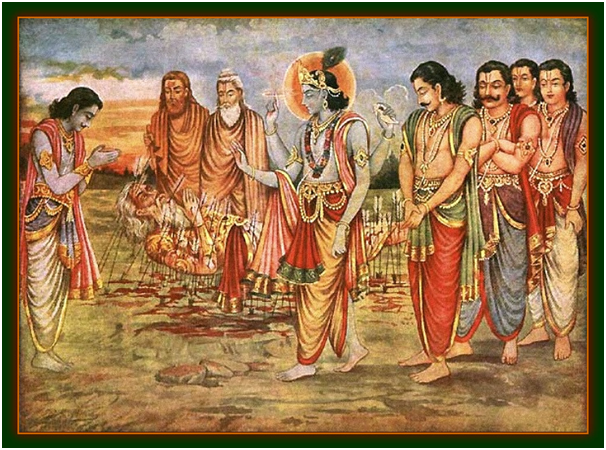Question: If Bhishma was a devotee of the Lord, then why did he choose to fight against the Pandavas? Also why did he have to undergo a painful situation of lying down in a bed of arrows? In addition, why didn’t Bhishmadev surrender to Lord Krishna like Vibhishana surrendered to Lord Rama? Is it because Bhishma gave more importance to his vow (his dharma) than to surrender to Krishna?
Answer by Romapada Swami: Bhishmadev is one of the 12 mahajanas, or great authorities in devotional service to the Supreme Lord, and an eternal companion of the Lord. As such, there is no question of his making a mistake or undergoing painful situations; such apparent mistakes or difficulties in the lives of pure devotees carry instructions for the conditioned souls as explained in the previous answer, or they are meant for enhancing the pastimes of the Lord and glorification of His pure devotees. All these different reasons are true in the enigmatic life of Bhishmadev. These apparent contradictions are nicely explained in Srimad Bhagavatam (Canto 1, Ch 9 “The Passing Away of Bhishmadev”)
Regarding Bhishma’s lying on a bed of arrows:
Bhishmadeva was endowed with the amazing benediction of leaving his material body at will, and his lying down on the bed of arrows was his own choice. His unflinching devotion and wisdom even in such a seemingly aggrieved condition speaks volumes of the character of Bhishmadev. This situation was especially arranged by Lord Krishna Himself to glorify His pure devotee.
Subsequent to the battle, Maharaja Yudhisthira was in a state of intense lamentation and remorse due to feeling responsible for the entire massacre; no one including even Vyasadeva or Krishna Himself could pacify the emperor. At that time, he came along with his brothers and Lord Krishna to seek instructions from Bhismadev, lying on his bed of arrows. Knowing that the great warrior was on the verge of leaving this mortal world and become liberated, all the great sages in the universe had assembled there, and although apparently in an excruciatingly painful condition, Bhishma received the sages and Lord Krishna in an exemplary manner, managed to pacify Yudhisthira, and spoke eloquently and at length, instructing Yudhisthira on religious and transcendental subjects, with stunning depth and clarity. This entire episode was orchestrated by Lord Krishna Himself just to establish the exalted character of Bhishma.
Although in the dress of a warrior and statesman, Krishna wanted to show the world that a pure devotee like Bhishma was no less in spiritual achievement than great sages such as Vyasadeva, Vasishtha or Narada. The Lord also wanted to show how a devotee is undisturbed and “always sound in body and mind by dint of spiritual enlightenment, and thus in any circumstances a devotee of the Lord is in perfect order to speak of the right way of life.” (Cf SB 1.9.1-10,25)
Regarding Bhishma’s fighting against the Pandavas:
Bhishmadev was fully aware of the transcendental position of Krishna and had no misgivings regarding the goal of all dharma being complete surrender unto Him – this is demonstrated in his instructions to Yudhisthira as well as the excellent prayers he offers to Krishna before quitting his body at will. Despite knowing all this, he was simply surrendered to be engaged in the plan of the Lord according to His will, even if it meant being on the wrong side and being defeated. It was the plan of the Lord to establish to the world that vice cannot conquer virtue, regardless of who tries to execute it. Bhishmadeva’s choosing to fight against the Pandavas was by the will of the Lord because the Lord wanted to show that even a fighter like Bhishma cannot win on the wrong side. (Cf SB 1.9.16)
There is also another deeper, internal reason for Bhishma’s taking the side of the opposing party, which is quite mysterious and can be comprehended only by understanding to some extent the nature of pure devotional service. Srila Prabhupada remarks that an astounding feature of dealings in pure devotion is that a devotee can please the Lord by playing the part of an enemy. Bhishmadev’s mood of devotion to the Lord was servitude, but he also relished exchanges in the chivalrous humor. He relished the opportunity to see the Lord face-to-face on the battlefield in his military feature, guiding the chariot and protecting His devotee Arjuna. He fought so valiantly so as to make the Lord break His own promise and take up a weapon to save Arjuna, thus proving the nature of his Lord as bhakta-vatsala. His entire meditation and absorption, even at the time of death, was on these chivalrous exchanges and feature of the Lord as Parthasarathi, whom he could observe with more relish than even Arjuna who was standing behind the Lord!
That it was all done entirely on the platform of pure devotion and nothing less is borne out by the fact that Lord Krishna personally came before Bhishma and awaited by him at the time of his quitting his body! (Cf. SB 1.9.33,38,39)







